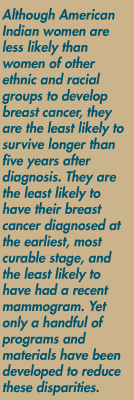Breaking with tradition, women from six tribes start a dialogue — and make a DVD — about breast cancer
Of the 217 American Indian languages still spoken today, few, if any, have a word for cancer.
There are words, though, for friendship and for motherhood, for health and for hope. It is from those concepts that the Mothers' Wisdom Breast Health Program draws its strength.
Guided by an advisory council of 11 women from six tribes, Mothers' Wisdom is a program of the UC Davis Cancer Center's Outreach Research and Education Program. Its goal: to address the unmet breast cancer prevention needs of American Indian women.
Although American Indian women are less likely than women of other ethnic and racial groups to develop breast cancer, they are the least likely to survive longer than five years after diagnosis. They are the least likely to have their breast cancer diagnosed at the earliest, most curable stage, and the least likely to have had a recent mammogram. Yet only a handful of programs and materials have been developed to reduce these disparities.
Marlene von Friederichs-Fitzwater, an assistant adjunct professor of hematology and oncology at the Cancer Center and director of the outreach program, set out to change that. The Susan G. Komen Breast Cancer Foundation awarded her a $25,000 grant to get started.
Six tribes sign on
The work started about two years ago. Linda Navarro, a respected figure in Sacramento's American Indian community, agreed to help. Of Cahuilla-Shasta descent, Navarro worked for the California Rural Indian Health Board for 26 years before joining the Sacramento-based Turtle Health Plan, soon to be the nation's first American Indian-owned, Indian-managed HMO. Representatives of the Ione, Miwok, Paiute, Comanche and Lakota tribes also signed on.
Navarro had seen a variety of outreach efforts come and go. Many were too clinical or weren't user-friendly; others failed to appeal to the diversity of tribal cultures.
"Some people think all Indians are the same people, "Navarro said. "There was not an American Indian advisory committee working on breast health, and that's really, really important. I knew the kind of impact this could have."
For her part, von Friederichs-Fitzwater interviewed tribal health educators and leaders across the country and attended health-related conferences and tribal gatherings. Her research taught her that American Indian women tend to focus on their children's health over their own, are rarely depicted in media stories about breast cancer, and shun use of the word "cancer."
"There's a concern or belief that saying it will bring it forth or make it real," von Friederichs-Fitzwater said.
Traditional values
The Mothers' Wisdom program faces these and other challenges directly.
First, in its method: A DVD will provide consistent, culturally sensitive information to women, regardless of their literacy.
Second, through its message: The DVD will incorporate traditional values, beliefs and philosophy with Western medical information.
"I think it's so important," said Billie Blue Elliston, a member of the Ione Band of Miwok Indians and an ovarian cancer survivor. "I don't think a lot of information gets out to the tribes. I think they'll be interested when they realize Native Americans are involved."
Elliston lives in Galt. She joined the advisory council at the urging of another member, Phyllis Cleveland, an oncology nurse of Miwok heritage.
Call to action
The DVD will include a call to action. It encourages women to be role models for their daughters and granddaughters. It targets poor nutrition and obesity, highlighting the availability of traditional, locally grown foods at farmers' markets and cooperatives. It includes a section on exercising without elaborate equipment.
Other segments still to be filmed: how to do breast self-exams (the Mothers' Wisdom council has decided to use the term "breast massage") and why regular mammograms are important. Helen Chew, assistant professor of hematology and oncology and director of the UC Davis Cancer Center's Breast Cancer Program, will add information on breast structure and function, breast cancer diagnosis and cancer treatment options.
Storytelling
Herbal and other traditional medicine lore will be integrated. The council plans to film a traditional blessing. American Indian cancer survivors will share their stories. All of the information will be conveyed through storytelling, consistent with American Indian culture, and backed by original music created and performed by members of the council.
Elliston said she has never heard American Indian women having an open discussion about breast health. She hopes the DVD, and future Mothers' Wisdom materials, will spark these discussions.
"It is something most native people don't talk about,"she said. "But it is something everyone needs to know about."
The advisory council plans were to screen the DVD for at least 50 American Indian women by the end of March and, after revisions, to show it to 150 more women from at least eight tribes.
Not long ago, at a meeting of the Mothers' Wisdom advisory council, the lights dimmed and the women watched a rough cut of the DVD for the first time.
Sometimes they nodded or laughed. In the end, they approved.
The program opens with Navarro standing before an image of Mt. Shasta and blue sky.
Her voice is calm, deliberate, warm.
She welcomes viewers.
Her face will be their face; she is one of them — a sister, daughter, mother, grandmother.


